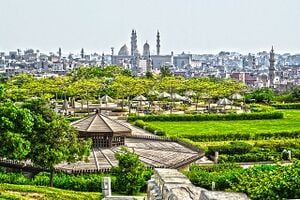
 A love letter to a regenerative community, Ecosystem restoration camps (Sep 07, 2022) — Habiba = Love
A love letter to a regenerative community, Ecosystem restoration camps (Sep 07, 2022) — Habiba = Love
Ecosystem restoration[edit | edit source]
- Habiba Community, Synergizing Differences
Sustainable transport activism[edit | edit source]
Urban sustainability[edit | edit source]
Cooperative housing in Egypt[edit | edit source]
Egypt is a highly urbanized country, whose population is growing by 1.3 million people per year. Rapid urbanization has brought with it a lot of informal housing, squatting and slums.
Cooperative housing, which first emerged in Egypt in the 1930s, provides an affordable housing option for a large number of citizens. It was originally the domain of private developers until the 1950s, when the government became much more strongly involved in cooperative housing provision. Then, in the 1970s, private developers once again played a key role, with the state supporting cooperative housing development through loans to cooperative associations.
The status of housing co-ops in Egypt is such that there are provisions in the nation's constitution requiring the state to take care of cooperative associations. They are exempt from a range of taxes and fees under the country's legislation, which also requires the state to facilitate loans and offer discounts on land. Housing cooperatives receive a guaranteed discount of 25 percent on land owned by the government, which ministerial approval can bring up to as much as 50 percent.
About one-third of the 80 million strong Egyptian population are members of housing cooperatives. In the last 60 years, more than 2,300 housing co-op societies, comprising half a million dwellings, have been established.[1]
Other initiatives
Cairo from Below, information and debate on the urban future of Cairo
News and comment[edit | edit source]
2021
New Global Coalition launched to address impacts of Climate Change, Jan 25[2] Developed by the UK in partnership with Egypt, Bangladesh, Malawi, the Netherlands, Saint Lucia and the United Nations, this new Coalition will work to turn international political commitments made through the United Nations Call for Action on Adaptation and Resilience into on-the-ground support for vulnerable communities.
2020
 Ecovillages as Hubs for Social and Ecological Regeneration, Ecosystem Restoration Camps (Jul 29, 2020)
Ecovillages as Hubs for Social and Ecological Regeneration, Ecosystem Restoration Camps (Jul 29, 2020)
2017
Singing for Peace – Dahab, Egypt, Nov 11[3]
The three-degree world: cities that will be drowned by global warming, Nov 3[4]
Egypt wheels out country's first bike-share program, Aug 1[5]
2016
Egypt's first solar-powered village rises from the desert in Bahariya Oasis, Oct 11[6]
2009
Mostafa Ahmed and more than 4,500 enthusiasts kicked off Egypt's first Cleanliness Day on April 10.<ref>Global Voices Online<ref>April 14. On April 10, the campaign was put to action in El Sharkia, El Mansoura, Agouza & Dokki, Al Arish, Heliopolis & Nasr City, Suez, Al-Haram (Pyramids Area), 6th of October, Al Zawya Al Hamra, Ain Shams University, Maadi, Helwan, New Cairo, Matareya, Shobra El Kheima, Meet Ghamr, Mohandeseen, and many more areas. The campaign was endorsed by the media and the Ministry of Environmental Affairs.
About Egypt[edit | edit source]
Egypt (Arabic: مصر Miṣr [mesˁr], Egyptian Arabic pronunciation: [mɑsˤr]), officially the Arab Republic of Egypt, is a transcontinental country spanning the northeast corner of Africa and the Sinai Peninsula in the southwest corner of Asia. It is bordered by the Mediterranean Sea to the north, the Gaza Strip of Palestine and Israel to the northeast, the Red Sea to the east, Sudan to the south, and Libya to the west. The Gulf of Aqaba in the northeast separates Egypt from Jordan and Saudi Arabia. Cairo is the capital and largest city of Egypt, while Alexandria, the second-largest city, is an important industrial and tourist hub at the Mediterranean coast. At approximately 110 million inhabitants, Egypt is the 14th-most populated country in the world, and the third-most populated in Africa.
Egypt has one of the longest histories of any country, tracing its heritage along the Nile Delta back to the 6th–4th millennia BCE. Considered a cradle of civilisation, Ancient Egypt saw some of the earliest developments of writing, agriculture, urbanisation, organised religion and central government. Egypt was an early and important centre of Christianity, later adopting Islam from the seventh century onwards. Cairo became the capital of the Fatimid Caliphate in the tenth century, and of the Mamluk Sultanate in the 13th century. Egypt then became part of the Ottoman Empire in 1517, before its local ruler Muhammad Ali established modern Egypt as an autonomous Khedivate in 1867.
External links[edit | edit source]
References[edit | edit source]
- ↑ Shareable, Oct 23, 2018
- ↑ gov.uk
- ↑ transitionnetwork.org
- ↑ The Guardian
- ↑ @AlMonitor
- ↑ inhabitat.com
